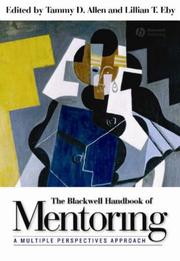| Listing 1 - 4 of 4 |
Sort by
|

ISBN: 9781405133739 Year: 2007 Publisher: Malden (Mass.) Blackwell
Abstract | Keywords | Export | Availability | Bookmark
 Loading...
Loading...Choose an application
- Reference Manager
- EndNote
- RefWorks (Direct export to RefWorks)
Book
ISBN: 1282139347 9786612139345 1444357379 1444310321 1444310313 9781444310313 1405179902 9781405179904 9781444310320 9781405179898 1405179899 Year: 2009 Publisher: Chichester, West Sussex, England ; Malden, Massachusetts : Wiley-Blackwell,
Abstract | Keywords | Export | Availability | Bookmark
 Loading...
Loading...Choose an application
- Reference Manager
- EndNote
- RefWorks (Direct export to RefWorks)
This book presents an evidence-based best practice approach to the design, development, and operation of formal mentoring programs within organizations. The book includes practical tools and resources that organizations can use, such as training exercises, sample employee development plans, and mentoring contracts. Case studies from organizations with successful mentoring programs help illustrate various principles and best practice strategies suggested in the book. A start-to-finish guide that can be used by management, employee development professionals, and formal mentoring program administ
Mentoring in business. --- Mentoring in business --- Mentors in business --- Business --- Employees --- Coaching of --- E-books
Book
ISBN: 9780415876476 Year: 2012 Publisher: New York : Routledge,
Abstract | Keywords | Export | Availability | Bookmark
 Loading...
Loading...Choose an application
- Reference Manager
- EndNote
- RefWorks (Direct export to RefWorks)
"We know that positive, fulfilling and satisfying relationships are strong predictors of life satisfaction, psychological health, and physical well-being. This edited volume uses research and theory on the need to belong as a foundation to explore various types of relationships, with an emphasis on the influence of these relationships on employee attitudes, behaviors and well-being. The book considers a wide range of relationships that may affect work attitudes, specifically, supervisory, co-worker, team, customer and non-work relationships. The study of relationships spans many sub-areas within I/O Psychology and Social Psychology, including leadership, supervision, mentoring, work-related social support, work teams, bullying/interpersonal deviance and the work/non work interface"-- "Preface Across sub-disciplines of psychology, research finds that positive, fulfilling, and satisfying relationships contribute to life satisfaction, psychological health, and physical well-being whereas negative, destructive, and unsatisfying relationships have a whole host of detrimental psychological and physical effects. This is because humans posses a fundamental "need to belong" (Baumeister & Leary, 1995, p. 497), characterized by the motivation to form and maintain lasting, positive, and significant relationships with others. The need to belong is fueled by frequent and pleasant relational exchanges with others and thwarted when one feels excluded, rejected, and hurt by others. Notwithstanding the recognition that all relationships can have positive and negative aspects, and that many different types of relationships can influence employee outcomes, most research has honed in on either the positive or negative experiences associated with a specific type of relationship. Because of this we lack both an appreciation and understanding of the full range of relational experiences. We also have not fully considered similarities and differences in relational experiences across different types of relationships, or how these experiences may differentially affect employee attitudes, behavior, and well-being. This edited volume tackles these issues head on, recognizing the powerful role that relationships play in our everyday life, and zeroing in on the cognitive, psychological, and behavioral processes responsible for such effects. Structure of the Book This book uses research and theory on the need to belong as a foundation to explore how five different types of relationships influence employee attitudes, behaviors, and well-being"--
Psychology, Industrial. --- Interpersonal relations. --- Employees --- Organizational behavior. --- Psychologie du travail --- Relations humaines --- Personnel --- Comportement organisationnel --- Attitudes. --- Attitudes
Book
ISBN: 9780199337538 9780190216849 0199337535 Year: 2015 Publisher: [New York, N.Y.] Oxford University Press
Abstract | Keywords | Export | Availability | Bookmark
 Loading...
Loading...Choose an application
- Reference Manager
- EndNote
- RefWorks (Direct export to RefWorks)
Scholarship and practice concerning work–family issues have exploded over the past several decades. Managing work and family responsibilities is a topic of interest to individuals all across the globe and a frequent topic of conversation in both the private and the public sector. Organizations have a stake too. Programs and policies intended to help individuals manage work and nonwork responsibilities are a major issue of interest with organizations. Work–family scholarship is rich and complex, emanating from multiple disciplines including psychology, management, sociology, economics, and human development studies. The Oxford Handbook of Work and Family assimilates state-of-the-art reviews of both established and cutting edge topics in the work–family field. Issues are addressed that pertain to individuals, families, the context within which individuals and families reside, and practice within organizations. Emerging topics are included that are intended to propel the field forward. The final section of the book is devoted to the development of future research. Leaders in the field who represent different domains and fields of study contribute the chapters in the volume. The volume should serve a multidisciplinary, global audience of work–family scholars, students, and practitioners.
| Listing 1 - 4 of 4 |
Sort by
|

 Search
Search Feedback
Feedback About UniCat
About UniCat  Help
Help News
News